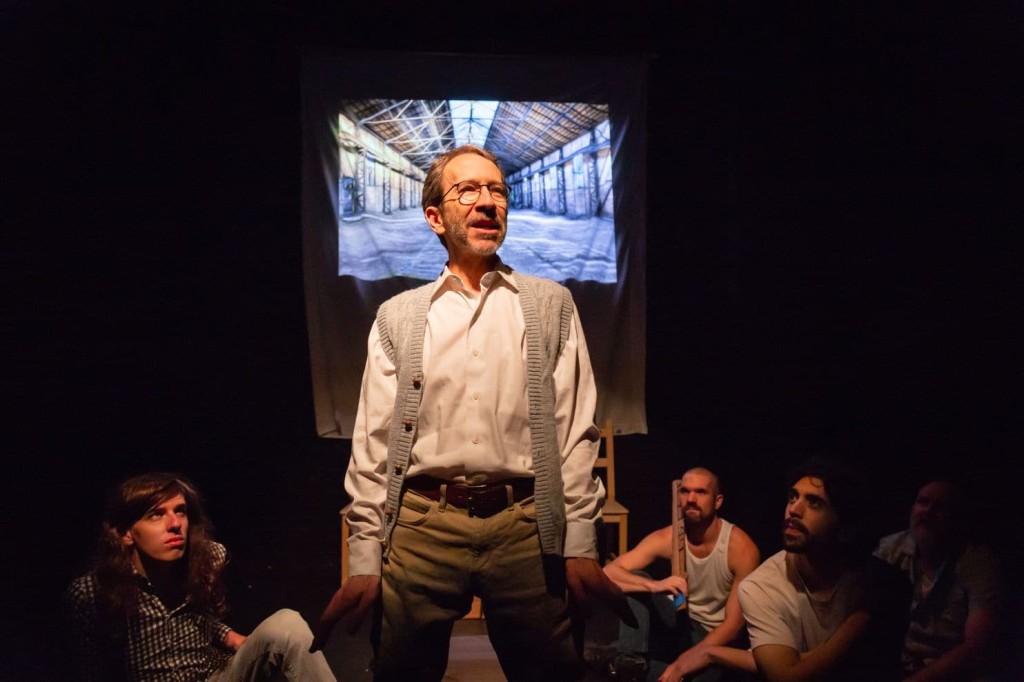 The new “How to Win a Race War,” at the DC Arts Center, is awful.
The new “How to Win a Race War,” at the DC Arts Center, is awful.
But The Klunch, the insurrectionist theater group putting it on, wouldn’t have it any other way.
The painful endurance test is the work of Ian Allen, a writer, director and Klunch artistic director who has become something of an expert on the overly-wrought, super-racist, anti-semitic, and cruelly mysognyst fictional texts that have inspired dangerous disrupters from Timothy McVeigh to Steve Bannon and are the basis of this three-act affront.
Allen has written extensively about this wayward strain of hateful and paranoid writing, which all have to do with the supposed extinction of the white race, and published a piece in the New York Times about it in July.
As if to show his research, he offers 16 such books for theatergoers to peruse before the show and during its two intermissions. Staging three one-hour scenes that reflect their clunky, hate-filled fears in three centuries is meant to be a satire.
But there’s not enough framing or even a wink to the audience to suggest that. Anyone walking in off 18th Street uniformed of the intent might think it all a sincere depiction of white nationalist fears and dreams. Dim as the tiki-torch handlers are (though many are “very fine people,” according to our current president), they might even unquestionably cheer its main points.
Anyone else, though, will squirm at the sheer offensiveness, if they don’t walk out altogether.
It all begins (once the books are collected), with the actor Ned Read addressing the audience, saying they aren’t actors but people trying to put across some white nationalist ideas, and please keep an open mind.
There’s even dialogue written into each act to emphasize their amateur cred: “Did I forget my line?” someone will say.
The 12 white, mostly bearded men play all the roles, including the female ones (though they raise their hands to the face of partners to approximate a kiss, lest they actually touch flesh).
The first scene, set in 1933 Virginia, reflects the most repulsive stereotypes of drunken, shiftless, and dim slaves dancing across the stage. They’d have blackface too if they had the wherewithal to do makeup (as it is, their props are all cardboard).
“I love the sound of darkies in the morning,” says one plantation owner, before moving to even more offensive terms.
The slave uprising that occurs is part horror film, part porn fantasy and 100 percent off-putting.
The second act is set closer to the Oklahoma City bombing, where a second cell of white terrorists plans its own vicious attack, complete with acid-filled squirt guns. They pause to watch a Janet Reno press conference about McVeigh’s bombing that killed 168 and injured 684 and cheer when it’s connected to Waco. There’s some rape involved in this one too.
The third act is an adaptation of a 2001 book “Hold Back the Day,” in which the dwindling white population of the future is forced to bow to non-white leaders and plans a way to create an all white colony on Mars.
The only laughs in the long, supposed satire comes from the ludicrous song choices, with slight lyric variations to recordings stolen from the Sex Pistols to the Beatles to Sir Mix-A-Lot.
But little else of what Allen presents is laughable, and handing out a magazine from the Southern Poverty Law Center at the end doesn’t exactly erase its hateful content.
Indeed, that more and more people at my matinee started picking up the offered books to flip through during intermissions might have indicated growing interest in the source material, surely not the result intended of a piece meant to target such tracts.
Like a full scale theatrical replication of “Birth of a Nation,” D.W. Griffith’s racist film depicting the rise of the KKK, “How to Win a Race War” is that odd show where nobody feels much like clapping, even out of polite custom, at the end of each act.
And when applause grows more robust at the conclusion, it may be only because it signals the end of this ugly, deeply failed experiment.
The Klunch’s “How to Win a Race War” runs through Oct. 21 at the DC Arts Center in Washington.